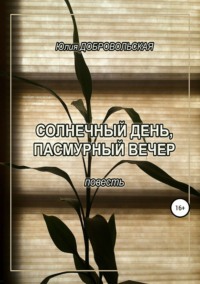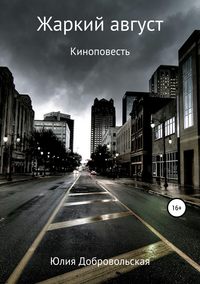
Полная версия
The Lovers
Sergey took Dina to the movies, holding her hand. In the cinema bar, he bought her a soda with a bright yellow, thick syrup, a flaky pastry, always the most golden one, sprinkled with large granules of sugar, and then wiped her lips with a handkerchief and brushed the crumbs off the collar of her dress.
Sometimes Sergey would read Dina his favorite books, and those were the happiest hours of their time together. Dina watched Sergey’s lips and often did not even understand what the book was about, but this was not important. It was not for someone’s adventures, even if they were fascinating, that she was sitting here next to her precious Sergey!
But then Albina remarried and moved far away to Kamchatka, taking Sergey with her. Dina mourned him for a long time and wrote him long missives using printed letters. Albina had sent one of the letters back to Dina’s mom a few years ago, as a keepsake.
Dina read it and laughed through her tears. “Helo Sergy. Today I went to the movees at 4 oclok. The movee was reely good. I reely liked it. Hau r yu? What movee did yu cee? I mis yu alot. Big kises. Yor Dina.”
Every word was written in a pencil of a different color, and the letter was a kaleidoscope of uneven letters and rainbow colors.
They next met at the seaside in Anapa, and Dina knew that Sergey was the love of her life.
Nevertheless, in fourth grade, Dina unexpectedly found herself in love with a boy with black curls, called Vova Gladstein, who appeared in their class in the middle of the year, and then disappeared just as suddenly in the middle of the following year.
“The father was transferred” was the reason for such comings and goings of several schoolchildren in Dina’s class, her school, and her town.
Vova went away and a gaping emptiness was left in her soul. Then Dina remembered Sergey and her heart went back to him once more. But not for long…
She fell in love again in eighth grade.
With Valera Revyakin, who was repeating the year, the biggest troublemaker at the school and a headache for all the teachers.
Why did he treat Dina in the same way that Sergey did all those years ago? He cared, and protected her – even though there was not much need for it – and Dina liked his touching solicitude.
It was interesting to hang out with him, as he told her different stories from his life, which made her blood run cold, and half of which, Dina later decided, were either made up or not Valera’s stories at all.
Then he moved away after completing ninth grade.
Dina remembered their farewell: her tears, which she could not hold back, his kiss on the lips, which she treasured for a long time.
“We’re moving really far away, to another country,” said Valera to Dina, making her swear an oath to keep this a secret, “so I won’t be able to write to you.”
Dina started writing to Sergey again.
The correspondence with Sergey somehow faded away on its own, and resumed only when Dina received a wedding invitation from him when she was already at university. She did not come, of course, for it was too far away and too expensive. She did not have the time either, not with all the lectures and exams. Nevertheless, she wrote him a warm letter and they continued to occasionally exchange news and photos.
Since then, Sergey had already gotten divorced and was not planning to marry again – or so he wrote in his letters to Dina. Dina sometimes imagined them meeting somewhere, and their old tender friendship blossoming into love, and then…
So she knew that a family started with love. This meant that someone she loved needed to be at her side. Love was forever. She did not take her mom’s experiences into account. Her mom was just unlucky for some reason.
* * *When Dina was very young, she once asked her mother, “Mom, why don’t we have a dad?”
Her mother answered very calmly. “Our dad died. Never ask me about him again because it upsets me very much.”
Dina did not want to upset her mother so she did not ask any more questions about her dad. If any friends living nearby or at the kindergarten asked her, “Where is your dad?” she told them what her mother had said.
One day, her mom came home with a new man and said to Dina,
“This is Uncle Tolya. He’ll live with us now.”
Dina was very excited and asked, “Can I call him Daddy?”
Uncle Tolya was delighted by this and said, “Of course, Dinochka, call me Dad.”
Everything was wonderful at the start, they went to the movies together, to the zoo, and skiing.
Dina was proud of her dad and happy for her mom, who laughed a lot and dressed up.
Then Uncle Tolya started disappearing somewhere for a few days at a time, while Mom went around with red eyes and her hair uncombed, and told Dina that she was sick and that Uncle Tolya had gone away on a business trip.
“Dad, not Uncle Tolya,” Dina corrected her mother.
Dina’s mom would give her a strange look, not say anything back, and disappear into the kitchen or bedroom for long periods of time.
One day, Dina came back from school and found Mom in tears, and Da– Uncle Tolya yelling at her mother, also with tears in his eyes. He was holding the kitchen towel and kept wiping his eyes with it.
“Opening your legs for other men, that doesn’t count either?!” he was shouting.
He repeated those words two or three times so Dina remembered them for the rest of her life. But she did not know what they meant.
She also remembered how a strange oppressive tension settled over the apartment after that. As if Uncle Tolya’s yelling could suddenly appear from any corner, or from behind any curtain.
When she was left home alone, Dina tried to air the apartment, she opened all the windows and even sprayed the air with her mom’s perfume or Uncle Tolya’s cologne, but nothing helped. The feeling of hurt, the tears and the destroyed happiness, were stuck in the apartment like an unbearable load. Her mother laughed less and less, and Uncle Tolya took them to the cinema or the zoo less and less often. Then he did not come home for a very long time, and Dina’s mom said that he had gone away.
“Forever?” asked Dina.
“Forever,” said her mom. “Never ask me about him again, it upsets me very much.”
So Dina did not. She never had a Dad after that.
The Student Dorms
Dina stopped to think about where she should go. The girls at the dorms were preparing for the exam that she has just passed. Aunt Ira was at work, Anya and Kolya were at university. It was cloudy outside and the rain could start at any second, and she did not want to get wet. It was rather boring to eat ice-cream alone in a cafe…
She decided to return to the dorms.
* * *The dorm rooms that were designed for two students usually housed three, and the rooms for three students housed four. It was the same in almost all the rooms, with very few exceptions.
On her floor, in the men’s half of the building, lived a husband and wife in a two-person room, Yuri Tolokonnikov, a long-haired gorgeous guitar player from Dina’s course, and Luda Zaytseva from the year above. They had gotten married last summer, and in September they were allowed to move into a separate room because they were from out of town, and they also said that they were going to have a baby soon. In actual fact, the academic year was nearly over and there was no sign of a baby or that one was on the way.
Four girls lived in the neighboring room, at least, that’s what it said on the list hanging on their door. Yet Dina had never met any of them except one, Tanya Kharitonova, from the Faculty of Mechanization and Automation. Tanya was rather odd, she could be very engaging and outgoing, or walk around with a dumb half-smile on her face, ignoring everyone. If you greeted her in that moment, she would only glance at you with a vague look and keep floating down the corridor, without saying anything. Sometimes she would lie on her bed and groan loudly, almost scream. The first time that Dina heard those terrifying sounds, she knocked on Tanya’s door, which was unlocked, and saw Tanya in that exact pose: knees under her chin, her arms wrapped around them, and her head swaying from side to side.
“Tanya, what’s wrong?” Dina asked worriedly.
“My period…” Tanya groaned.
“Do you want some Tylenol?”
“No… it won’t help… go away.…”
“Are you sure?”
“Yes!”
Dina only realized what had really happened to Tanya many, many years later.
* * *Dina’s classmate, Arthur Davlatyan, who came from Armenia, also lived alone in a two-person room. Dina didn’t wonder why he was so lucky – he just was.
Arthur was a generous guy and often had a group of classmates over, to celebrate a completed group project or an exam with tea. He always brought out a bottle of cognac with the tea. Not the usual cognac bottle with the factory cork and the regulation labels, but a large milky-white plastic flask, probably a liter in size. He always had incredibly beautiful and incomparably delicious dried fruits and nuts. Having once tried Arthur’s delicacies, Dina could look with nothing but pity at their pathetic copies, displayed on the shelves of stores like Nature’s Gifts.
Sometimes Arthur invited Dina to his room, to ask for her advice regarding a test or a term paper. Dina conscientiously explained all the hard parts to him, although she knew that it was hopeless since Arthur would never write the paper or project himself, so it was easier to simply write it for him. Which is what she did.
She did not like it one bit. If it had been first year, that would have been one thing, but they were in fourth year, and Arthur still had not completed a single exercise without someone else’s help… How was he going to write his thesis? How was he going to work in this field? If he had to answer at the blackboard or during an oral exam, he muttered something unintelligible, plus his accent made his answer completely incomprehensible. But his record book didn’t have any threes… not that he had any fives either, just fours. Dina was really surprised, as she knew plenty of smarter and more talented guys who the teachers were not so generous with.
“Arthur,” Dina would say emphatically, “Why don’t you study? At least memorize something, even if you don’t understand anything! Fine, I’ll write the paper and the project for you… But you’ll have to get a job in the future, and you don’t know anything, you can’t even tell an acid from a salt by its formula!”
Arthur would only smile with his beautiful Eastern lips and drop his lush eyelashes over his velvet gaze. Then he would take a large packet of mandarins or dried fruit from the cupboard, place it on the table next to Dina and say, “I will not work. I only need diploma. And you will not work. You will live like a queen!”
No, Dina simply could not comprehend that – to go to university but not to study, to get the diploma but not work in the field!
It seemed that Konstantin Kolotozashvili also could not comprehend this – Dina heard rumors that Arthur had to try five times to pass every exam, and that Konstantin Konstantinovich was tortured every semester in the Chancellor’s office, who made him change Arthur’s mark from “Satis.” or “Unsatis.” to “Good.” Then they would send Davlatyan to another teacher to retake the exam, who would then give him a four.
Dina occasionally considered Arthur as a possible partner. Especially as he had paid her special attention since first year, and even invited her to Armenia with him every summer. He told Dina that she would not have pay anything for the trip, that he would buy her the tickets and food, and even new clothes, and that he would take her to sea, whichever one she prefers, the Black Sea or the Caspian Sea…
When Dina told her mother about this, her mom started to actively persuade her daughter to go with Arthur to his homeland. But the Inner Voice, although brief, persistently told her not to go. “Don’t… don’t…” it repeated quietly but very firmly.
Dina never told her mom about Arthur again, and in response to questions about him, said that he had a long-term girlfriend. What if Dina told her mother that Arthur was proposing to marry her in the last year of university, and for her to go to Armenia, where she could live like a queen?
Dina did like Arthur. He was courteous, well-mannered and generous. She liked his appearance too. He was tall, slender, with slightly darker skin, beautiful hands and dark, kind eyes. Once, not so long ago, just before this spring term, Arthur had almost kissed Dina…
She had written him a rough draft of a term paper, and as usual, he had taken something tasty out of the cupboard, placed it on the table, and hugged Dina. Dina stood up from the chair and looked at him in surprise. He took her by the shoulders and brought his face close to hers. He was looking into her eyes, as if asking: May I? If he had not asked, Dina would have been all for it. She had never kissed anyone as an adult. She even got nervous as she waited for the kiss. But he was waiting for her permission, which she did not like. She said, “Don’t, Arthur.”
Arthur dropped his thick eyelashes over his eyes, smiled slightly, and let Dina go.
And Dina had left his room without taking the packet of dried fruit, back to the three-person room where four girls lived.
If Dina became the wife of Arthur Davlatyan, she would live with him in his very non-student-like room with carpets on the floor and the wall, the KVN television set and the Comet tape player. But she was not sure that she loved Arthur. It was one thing to like someone, but love… love was something else completely, Dina was sure of it, so she continued to live in the cramped room with one table for four people.
Neighbors
“Did you pass?” Vera and Valya asked almost in unison when Dina appeared in the doorway.
They sat on either side of the rectangular table, which served as both a desk and a kitchen table, with their books and notebooks spread out. Dina’s artisanal cheat sheets lay in two piles at the edge of the table.
Vera and Valya were studying in a parallel group, so their exam with Konstantin Konstantinovich Kolotozashvili was tomorrow.
“Did you have any doubts?” replied Dina, and started changing.
“About what?” asked Valya.
“Ask something more interesting!” said Vera and threw a curious glance at Dina. “You got a five, I bet.”
“Really?” asked Valya incredulously.
Dina did not reply, taking off the whispering weightless cloak and changing into her fur-trimmed home slippers, which were slightly worn out but still quite neat.
She approached the table, looked over Vera’s shoulder into her notebook, then at the book, turned a few pages and said:
“You should memorize this. Kokon always fails people on the additional questions.”
“Kokon fails everyone on everything,” Valya said quietly.
Valya came from a village in the Vologda Oblast and could not get used to the big city even after four years. She spoke quietly, either because of her strict domestic upbringing, or because she was embarrassed by her country accent and provincial appearance, or maybe because of all of the above.
Once, Valya had asked Dina to work with her on grammar and pronunciation, flushing with embarrassment. Dina had written out a long list of Valya’s mistakes, which she had successfully fixed during the academic year. It was only the characteristic okanye1 that seemed incurable.
“Yes. Everything,” said Dina. “But this is his favorite this term.”
Vera rushed over to the larger pile of cheat sheets and started rustling through it, looking for the right one.
“What did you get?” she asked.
Dina replied calmly:
“That’s what I got.” She added after a pause, “But he gave me five points automatically.”
Both girls stared at Dina in amazement. “Kokon?! Automatically?!”
Dina sat down on her bed and leaned back against the pillow. “Well, not quite, not automatically… semi-automatically.”
Vera and Valya again exclaimed almost at the same time, “Semi-automatically? What does that mean?”
“I took a question sheet, prepared my answer, approached the table and sat down, and then he said to me: ‘I don’t doubt your knowledge and won’t waste time asking you.’ He didn’t even look at my draft.”
Vera tsked. “What a beast! Why couldn’t he say so straight away?”
“That’s Kokon for you!” Added Valya.
“But do you know of any other teacher who loves his subject as much as he does?” asked Dina.
“He loves the ladies, not the subject,” interrupted Vera.
“Well, he’s not such a beast after all…” Valya interjected. “I remember how in the first lecture, he made it sound like I should just pack up and leave the university immediately, and then he ended up helping me on the exam.”
“What about his humor?” Dina suddenly wanted to discuss Konstantin Konstantinovich, for some reason. “Everyone at university quotes his jokes!”
“Oh yes!” Valya agreed. “Yet he never repeats himself… not like that man… who teaches scientific communism… when he makes a joke, you don’t know which way to look…”
Vera rolled her eyes up dreamily. “Yes, Kokon is not a man you’d forget even after university. He’s a ray of light in a dark realm!” Then she remembered where she was, and picked up a book again. “All right, enough chit-chat, I’d like to pass the final exam on first try!”
Dina stretched out on the bed and put her hands behind her head.
“Go ahead, I’ll have a rest. Let me know if you’d like some tea.”
She looked at the color portrait of Muslim Magomaev, whose songs she adored, especially the recording in Italian. She had cut out his picture from a magazine, maybe the Soviet Screen, and it hung opposite Dina on the side of the cupboard, together with a few other portraits, each one with their own story.
There was Jean Marais, smiling from a glossy photographic print, which Dina had begged from her aunt, and who had received in turn from her friend. There was an autograph in the lower corner, done in blue ink. Although Aunt Ira tried to explain to Dina that the signature did not belong to Jean Marais himself, that her friend had added the autograph herself, Dina refused to believe it.
Next to it hung the terrible quality picture of Anna Magnani from a film Dina had never seen, which had been copied from a tiny photograph and enlarged to the size of a magazine page. She had once read a small article about the Italian actress with the beautiful name that was so well-suited to her unusual appearance. The article was illustrated by a few black-and-white shots from the films that she starred in. The image that was hanging on her cupboard now – the actress’ face with contrast lighting – was the one that Dina had liked the most, and she had asked the laboratory technician from the school physics laboratory to copy and enlarge this portrait.
Slightly to the left hung Dina Durbin. An attractive woman, but not in Dina’s taste. It was her mother’s idea: to name her daughter after a famous actress with a surname that was so similar to her own.
“When you become famous,” her mom would say, “people will only remember Dina Durbin because her name is similar to yours!” And she would chuckle.
There was the portrait of Dina’s favorite author. Dina had begged her mother for this portrait for a long time, done photographically on embossed paper that looked like fabric, with a loop attached to the thick cardboard backing – a serious, well-made portrait. It had cost two rubles and ten kopeks, serious money for their budget, especially since Dina’s mother did not consider a writer’s portrait to be an essential item, even if he was a favorite. Nevertheless, when Dina finished nine classes with almost perfect marks, with only one four, her mom remembered the strange request and decided to reward her daughter for her hard work. Besides, it was when her mother had been promoted at work, and she started to earn eighteen rubles and forty kopeks more every month. Dina’s mother was not in fact greedy, just very practical.
And Muslim Magomaev… He does look a little like…
Never mind! It’s not important right now! Dina wanted to remember how the exam for her toughest subject had gone. She mentally rewound the imaginary film, which had recorded the events, and started watching.
Here she is walking to the teacher’s table, catching his eyes, which are staring at her legs, and stopping midway. Konstantin Konstantinovich Kolotozashvili, dressed in a loose red shirt, with a high collar and wide sleeves, gathered at the cuffs, which is open at the chest and tucked into tight black pants, rises from his chair and stands to his full considerable height. He extends his arms towards Dina and says in a rich baritone, “Congratulations on an excellent finish of the semester, Dina Aleksandrovna.”
In the exact moment that Dina, trembling with happiness, realized that her teacher was actually Muslim Magomaev, somehow here, in the exam auditorium, her neighbor Vera stuck her head through the doorway, and unceremoniously interrupted this incredible moment of meeting her favorite singer:
“Dina, why aren’t you getting changed? Some tea would be nice.”
Dina clearly knew that Vera was not present at the exam…
She opened her eyes.
Muslim Magomaev was looking at Dina from the photographic print, with a red shirt open at the chest, extending his arms towards her, with his mouth wide open, as if he was saying “Congra-a-atulations.” Vera was sitting at the table, leaning back on the squeaking chair.
“You’ve got nothing to do anyway,” she added. As if Dina needed to be persuaded or compelled!
Dina stood up, fixed her clothing, and picking up the kettle that stood on the windowsill, stepped out of the room. She headed to the kitchen to boil the water on the gas stove, and so couldn’t hear the conversation of her two neighbors behind her.
Vera: “She’s so lucky, getting out of this exam.”
Valya: “Yes, and with perfect marks too.”
Vera: “Well, she doesn’t get these fives easily.”
Valya: “Yeah… only this one seems to have dropped down from the sky.”
“Yup, you don’t say. And from Kokon, of all people!”
“Maybe she has really caught his eye?”
“Hmmm, maybe. She’s not gorgeous but she can present herself well.”
“That’s true.”
“She’ll be an idiot if she falls for him.”
“Yeah… Like Rimma, and then she’ll need to get an abortion… Where is our Rimma, by the way?”
“In the reading room, maybe.”
“Ha! Rimma in the reading room! Don’t make me laugh!”
“She needs to retake the exam with Barbara, and unless she studies her butt off in the reading room, she won’t pass.”
“True.”
Dina entered the room in that moment, together with the boiling kettle and Rimma, the fourth occupant of the room, whom Vera and Valya had just been gossiping about.
Rimma
Rimma, an eye-catching brunette with dark gray eyes and the graceful moves of a capricious cat, was a very attractive girl. Yes, it could be said that Rimma was the only exception to Dina’s theory that beautiful people were either not real or lived in faraway places. Like Anna Magnani.
Rimma was good at utilizing the modest arsenal of makeup that the poor university students could afford: pearly eye shadow in either gray or light blue, often bought from gypsies, made from goodness knows what, and placed in a plastic black or white checkers piece, covered with a piece of cellophane, and dark pink lipstick, which she saved for special occasions. Her eyeliner was the same as most of the other girls: a black pencil from the Artwork pencil set. Rimma wore her hair in a ponytail, like Dina and most of the girls, but her hair was thicker and shinier than the others. Yes, Rimma could certainly be called a beautiful girl.
She was also very good at drawing. She had a large set of pencils in a huge carton, which opened and could be set up in a special way, so that the pencils were displayed at a few different levels, and a box with pastels. Rimma used the pencils for the usual drawing album, and the pastels for large and small pieces of black paper, which were used to cover photoplates, and which, Rimma said, her father especially collected for her from his photograph friends. Rimma Yakovleva also sang beautifully and played the guitar.
But she studied at university without any desire or diligence. Maybe not everyone, but Dina knew that it was not because Rimma was stupid. It was just that she found it boring. Nobody knew what she was really interested in – perhaps drawing, singing and reading?









